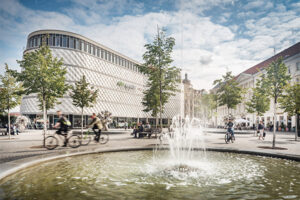ACROSS: Will the current crisis strengthen the online retail sector?
HANNU KÄKI:I see this can be also an opportunity for the so-called traditional retail environment. First, the landlords and retailers will learn to cooperate to overcome external threats like covid-19 and e-commerce. Second, the consumers will learn to value social interactions in retail environments. Third, the smaller retailers will be recognized as an important part of the mix and served with a different attitude in the future.
In the short-term, I believe many retailers will keep investing heavier in their online strategies. However, when coming out of the crisis, after weeks or months of social distancing, consumers have realized the very human need for meeting places. They will be returning to shopping malls to enjoy and experience a good mix of services. This opportunity is too big for retailers to overlook as they won’t be able to fulfil the same needs with pure online and especially through their own offering.
During the isolation the importance and possibilities of multichannel communication between shopping mall management, tenants, and consumers has become clearer to everyone. The most advanced mall operators can serve their tenants as one of the core channels to reach the local market. After the crisis, the cooperation between the landlord and tenant will focus more around topics like how they can reach consumers, improve the consumer journey, and understand the success of each marketing action. When done carefully, this can be linked to retailers’ own strategies as well.
ACROSS: Do you see any other concentration processes in the European retail landscape?
KÄKI:During past few decades big international retailers have spread everywhere. On the other hand, we have seen owners and managers becoming more international and operating dozens of retail destinations. E-commerce has become one the core channels for many retailers and, at the same time, the real estate industry has finally woken up and takes digitalization more seriously. The Covid-19 crisis has been an exceptional external threat for each party. It has also challenged everyone’s capability to cooperate instead of focusing on survival strategies that may only polarize the business environment. In some countries, local guidelines supported by governments have been a great support as well. Once Covid-19 will be behind us, the need for cooperation between landlord and tenants will still exist. This time the external threat is the change of consumer behavior. Both parties will have to truly commit to delivering better experiences for the consumers. This is the only way they can build long-term business success.
The landlords will also have to be able to define their own core areas. For example, the landlords have a real value in offering the right tenant mix and mix of asset types. Combining living, working, experiencing, and consuming within a one area is convenient for consumers. But how all this will be delivered to consumers is a different question. In my opinion, the landlords should be very careful when they define their strategies and choose the supporting tools and processes. In-house solutions may feel like a good choice but, in the long-run, you end up paying much more for something that is outdated.
ACROSS: Do small retailers even have a chance to survive? If they do, how?
KÄKI:There’s no single short cut to survive the current turbulences, especially for the smaller retailers. However, some of them will come out of the crisis and become even stronger. It doesn’t only depend on how landlords and governments will have supported them. Their capability to adjust their business model and operations also plays a crucial role. How they will have repositioned their customer focus and retarget them. A good example is that, together with the malls, they have been able to reach consumers and even organize alternative delivery models instead of traditional visits. Consumers still love to experience a different set of services. Small and innovative entrepreneurs are the cornerstone of this approach. Their organizations have the necessary freedom and creativity.





